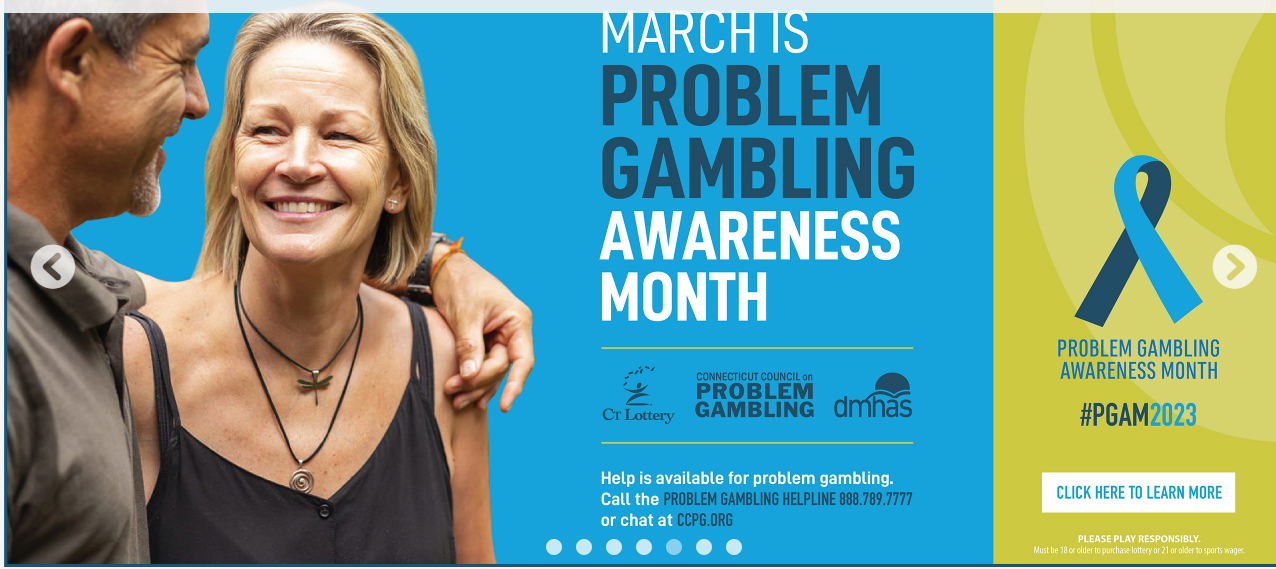
The American Gaming Association estimates that during March Madness this year, 68 million adults will wager $15.5 billion on the NCAA Men’s Division I Basketball Tournament. The number of college students In Connecticut in 2020 there were about 196,000 college students, the majority of whom were under Connecticut’s legal gambling age of 21 for sports betting. However, some students bet with friends. The older friends of legal age place the bets.
March is Problem Gambling Awareness Month in the United States according to The National Council on Problem Gambling. This is the 13th year the council is making gamblers aware of potential problems associated with gambling in March. Many betting establishments, including lotteries, also participate.
For example, the Connecticut Lottery has a banner on its website stating March is Problem Gambling Awareness Month. The Council estimates that two million adults in the U.S. are pathological gamblers and four to six million exhibit mild or moderate gambling problems. The Council also assesses that the average problem gambler’s gambling negatively affects seven to 20 other individuals including family and community members.
The council conducts an annual national survey on gambling attitudes and gambling experiences. The 2021 survey shows that those under 35 have a higher risk of problem gambling than other demographics. It is suggested that this demographic be targeted for prevention efforts.
The International Center for Responsible Gambling reports that 6 percent of college students in the U.S. have a serious gambling problem. Students may experience failing grades. The report states teenagers and college students are impulsive and at risk for developing gambling problems. Most adult gamblers begin gambling at younger ages.
Six states have online casino gambling including Connecticut, Delaware, Michigan, New Jersey, Pennsylvania, and West Virginia. The American Gaming Association (AGA) states 33 states and Washington D.C. have legal live and retail sportsbooks as of March 16, 2023. Hawaii, Vermont, Texas, Oklahoma, Kentucky, Missouri, South Carolina, and Minnesota have active legislation to legalize sports betting. States that do not intend to legalize sports betting include California, Alaska, Alabama, Minnesota, Idaho, and Utah.
As more states legalize online betting for casinos, more online legal sports gambling will follow. Sports gambling is growing in popularity. For example, The American Gaming Association reported that Americans bet $92.2 billion on sports in 2022. This was 72.9 percent higher than 2021, from $4.34 billion in 2021 to $7.50 billion in 2022. The following AGA quote shows that Connecticut’s iGaming is rapidly increasing:
Combined January 2023 revenue generated by iGaming operations in Connecticut, Delaware, Michigan, New Jersey, Pennsylvania, and West Virginia increased by 20.6 percent year-over-year to $482.0 million, tying the single-month record from December 2022. All six markets reported annual growth for iGaming revenue with half – CT, MI, NJ – setting single-month state records.
Colleges and universities are entering contracts with gambling companies to promote gambling on their campuses in exchange for millions of dollars. Eight universities are partners with online sports-betting companies and more will follow.
For example, in 2021 Caesars Sportsbook agreed to pay Michigan State University $8.4 million over five years to promote gambling on campus. Also, Louisiana State University signed a contract with Caesars.
Students, including those under the age of 21, received encouraging emails to bet and receive bonuses for doing so. Many are opposed to college and gambling company partnerships.
L.S.U. journalism Professor Robert Mann is an outspoken critic of the partnerships “It just feels gross and tacky for a university to be encouraging people to engage in behavior that is addictive and very harmful,” he told the New York Times.
Connecticut Sen. Richard Blumenthal sent a letter to Caesars Sportsbook & Casino on November 25, 2020. He urged them to “end its practice of targeting colleges and universities, discontinue any existing partnerships with schools, and abide by industry standards that prohibit marketing to college students.”
Our students are clearly being targeted to engage or continue to engage in gambling. Colleges and universities are entering partnerships with gambling companies for revenue in exchange for encouraging students to gamble. Students are vulnerable and need to be informed of the problems associated with gambling. Most schools have prevention programs for alcohol and other health issues. Most do not have specific gambling prevention programs.
It is paramount that schools develop programs or buttress existing programs to provide students with the information they need to make informed decisions regarding gambling.
C. Kevin Synnott, PhD, is a Lecturer of Management and Marketing in the Department of Business Administration at Eastern Connecticut State University.